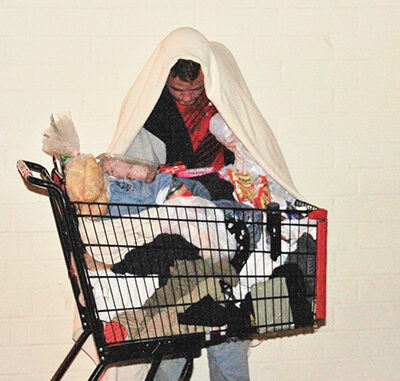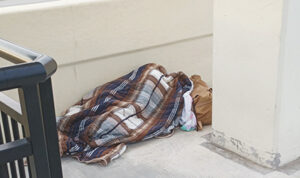

By Andreas Butler
On March 20, Florida Governor Ron DeSantis signed the anti-public camping bill into law, which prohibits municipalities from allowing people to camp or sleep on public grounds without a permit.
Proponents of the new law say it will help provide much needed wrap-around services that the homeless need and address sanitation issues while opponents say the bill is discriminatory, will cause problems with the homeless and strain resources.
The law officially goes into effect on Oct.1. It requires municipalities to designate a specific public space for camping and sleeping, if the shelters are full, with approval from the Florida Department of Children and Families.
They must include security, behavioral health services and bathrooms with running water.
A homeless man who only would identify himself as “The Big Cart Guy’’ said that he spends a lot of time pushing his cart around and fishing. After being homeless in Florida for the past few years, he planned on returning home to Pennsylvania on Wednesday.
He told the Daytona Times, “I am on the fence on a lot of this stuff. The law is discriminatory and just stupid, but it is there for a reason. Ninety-eight percent of what I have in my cart is fishing gear. I make a living selling my fish. … Daytona has its homeless problem, but it’s not like Kissimmee, Orlando or Miami. I am homeless. I am here on a poor man’s vacation.”
Although there is some ill will and racism toward the homeless, this homeless person says there is some blame on the homeless for how the public sees them.
“Many people are home- less because they don’t want to grow up and won’t do right. Many have legitimate reasons, but many homeless people out here have parents living around the corner or a block away,” expressed the guy with the cart.
“Did you see the destruction they did in the woods at these camps? It’s disgusting. They leave everything. If they are there for six months, they leave so much garbage and debris. There are also a good number of food pantries in the area.
He continued, “I don’t think they’re using the resources available in the community. The only thing that sucks is that the jobs don’t pay enough to cover rent here. You’re not going to have good paying jobs in Florida until you get unions.”
Those who provide services for the homeless are also waiting to see how the law impacts their services. They admit it’s already challenging providing the best services available for the homeless which are the services the homeless really need.
This has been a familiar scene in Daytona Beach as the area’s homeless bundle up while sleeping on the ground.
Shelter director and sheriff responds
The First Step Shelter in Daytona Beach is a homeless shelter for single adults in Volusia County. In addition to providing shelter and a hot meal, it provides health, addiction and counseling services to the homeless as assisting with jobs and housing.
“I don’t see the new law impacting the way we provide our services, but we may need to open up more beds. I think we’ll see it having more of an impact on communities that don’t have shelters or space to house the homeless in place,” commented Dr. Victoria Fahlberg, executive director of First Step Shelter. In the past, the homelesshave complained about the shelter being too far out and having too many requirements but the shelter leader differs.
“We are already doing what we need to do and providing wraparound services for everyone who comes to our shelter,” said Fahlberg.
“We must create space and acquire space. Right now, we haven’t been reached by any local government about additional services.”
Halifax Urban Ministries (HUM) is a faith-based non-profit that provides services to the homeless and needy families, including food, bus fare back home or to a city where they have family and housing. HUM didn’t respond for comment by the Times’ Wednesday night deadline.
In response to the law, the city of Daytona Beach has implemented a $25,000, 60-day pilot program that runs six days a week to beef up security on Beach Street between International Speedway Boulevard and Orange Avenue. The purpose is to keep people feeling safe. The area has seen an increase in homeless people.
Law enforcement already has challenges dealing with the homeless as it is. It remains to be seen how they will enforce the law.
“I know the purpose of the law is to prevent our towns, cities and municipalities in Florida from becoming like San Francisco and other cities where camping in public places has destroyed the public scene. Also, our legal is reviewing how we’re going to implement this. That way we can train deputies on how to apply the law,” responded Volusia County Sheriff Mike Chitwood.
A homeless man on Beach Street in Daytona Beach carries his belongings in a grocery cart.





Be the first to comment